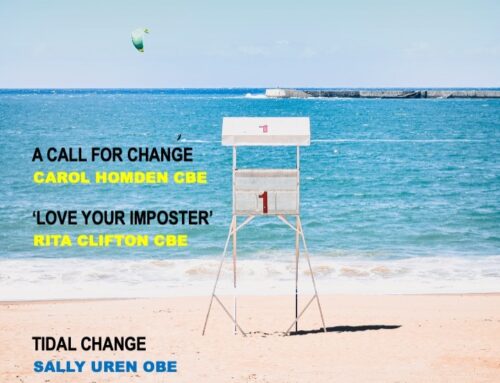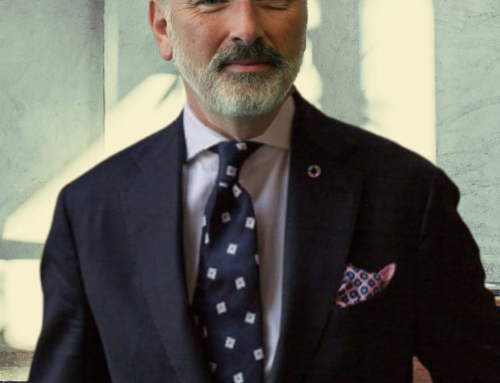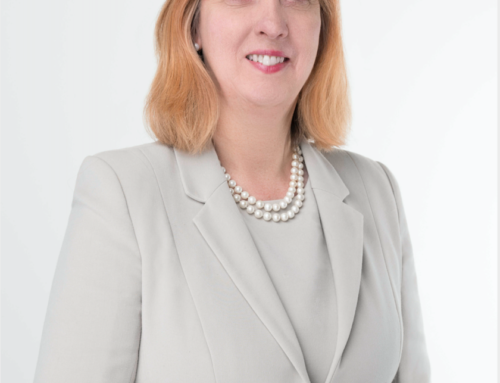A Founder’s Reflection

In the last six years the Forward Institute has grown from a curious hybrid – simultaneously a scrappy start-up and a coalition formed by the leaders of some of the UK’s most significant institutions – into an influential and innovative non-profit. More than 450 leaders from organisations such as the Army, Bank of England, Tesco, Barclays, BP and easyJet have gone through its 18-month responsible leadership Fellowship programme. It works with their chief executives in peer groups to support and challenge, and brings together senior leaders with community activists to learn from each other. The Institute declines to ‘teach ethics’, instead putting people through experiences that ask them to walk towards dilemmas and seemingly intractable problems; and helping them form long-term relationships with people from different sectors and perspectives.
But how does an organisation dedicated to ‘responsible leadership’ define such a woolly concept? Professor Veronica Hope Hailey, former Dean of the School of Management and Vice President of Bath University, interviewed Adam Grodecki, its founder.
Veronica: When you first started to think about the idea of responsible leadership, what were the principles that you came up with to underpin the design of the Forward Institute?
Adam: I wasn’t an expert in leadership, or HR. I started with one quite simple observation – that at big picture level, the way we are developing our leaders as a society is failing.
Imagine drawing a graph and plotting expenditure on leadership development, MBAs, coaching, etc over the last three decades. It increases almost exponentially. Now on the other axis, plot public trust in leaders. It doesn’t exactly go up! There is not a healthy correlation between these two things.
What has been going on? Everyone in the leadership industry needs to ask tough questions about what they’ve been doing.
So, my question was: ‘what will it take over the next decade to build a cadre of leaders who can lead our most important organisations in a way that the public wants and deserves?’ That question felt important in 2015 when we started. It feels even more important today.
Veronica: So your approach wasn’t, ‘okay, how do we change leadership programmes over the next two years?’ It was ‘here’s a 10 year horizon of how we create a new generation’. The long term vision is really interesting. But the other phrase you used is ‘what the public want’. How did you think that through?
Adam: We’re not an arbiter of what is or isn’t good for the public. But it is vital that leaders have space to explore the big questions facing society, to hear from voices outside their ‘bubble’ and to build their moral muscle.
Climate change, inequality, poverty, privacy, AI, questions of race, gender and identity – these are all complex, difficult topics. They require nuanced thought and deep listening to other people with different experiences, and time to work out what you really think. But leaders have historically been rarely given space to do that work.
Veronica: So what you’re saying is, ‘do they have the skills, the thoughts and the time to actually think about these big issues that are vital to society?’ Why, with the benefit of hindsight, do you think those three things were missing?
Adam: I experienced this as a consultant and in banking: the busyness is insane. Part of that is an ‘addiction to work’ issue, and a part of it is cultural pressure. The pace is relentless, particularly if you’re ambitious. I remember talking to bankers who were picked up by a car early in the morning and be into calls straight away while being driven to work. And lawyers who would laugh about how many weekends in a row they’ve worked. Literally, there’s no space in their lives, ever. It becomes an excuse to not have to think about what is really going on. You can avoid the challenging stuff because you’re so busy.
Veronica: How did that shape how you set up the Forward Institute?
Adam: First, our mission is explicitly about responsible leadership. So we work hard to create an environment where leaders to step out of the madness of their lives and properly consider this question of responsibility. To pause, look up and out, and ask bigger questions about themselves and their organisations and their place in society. To reflect on the power they have, and who they are responsible to and for what…
Second, when organisations go wrong it’s usually not because they are full of evil, greedy people. It’s because they’ve become institutionalised. The Chilcot Review of Iraq was damning about group think in the military. The same is true of scandals at BP, Carillion, Volkswagen, the banks. I could go on… People are profoundly shaped by their environments. Being senior often requires that you’ve spent most of your career inside that sector. That profoundly shapes your mindset, ideas, what you think is possible, and what you accept as ‘normal’.
So this idea of external challenge is key. We bring together leaders from very different types of organisations to learn alongside each other and be exposed to different thinking, so they’re able to critique and challenge the assumptions they and their organisations hold.
The third idea is around internal challenge. At the banks it wasn’t that no one knew aggressive selling of PPI was going on. Or at Volkswagen, no one knew they were cheating admissions. Literally thousands of people knew, but they couldn’t have a serious internal discussion about it. So we try and support leaders to walk towards these more challenging problems and examine the gap that exists between rhetoric and reality.
Veronica: Thinking about COVID. During the last year, many of these principles the Institute adopted, have suddenly come alive for many organisations. Did you watch what was happening and think, ‘Oh, we got that right, clever us’ or did it prompt change within the Institute about how you think about leadership development?
Adam: In many ways it’s reinforced these ideas. But I do really worry about whether we will be able to take the lessons from this period. There’s a lot of talk about change – but I suspect we may collectively miss the opportunity to address deep issues it has exposed in our organisations and society, just as we did with the financial crisis.
Post the financial crash there were calls for significant reform. Leaders agreed the financial services sector needed to change. Media attention and public demonstrations kept the pressure up. There were conferences, high-level discussions, working groups and reviews. Despite all this, some years later, it is apparent the crisis was ultimately a missed opportunity. Great work was done on the urgent task of ensuring a similar crash would not happen again. But many of the wider, deeper questions were not resolved. Arguably, the failure to deal with these issues has significantly contributed to much of the discontent, division and political instability we witness around the world today.
So we’re thinking hard about how we can best help leaders reflect on the big questions thrown up by COVID. How do we ensure the urgent doesn’t get in the way of the important again?
Interview with Adam Grodecki,
Founder and CEO of The Forward Institute,
by Veronica Hope Hailey,
Prof Emeritus at University of Bath.
https://www.forward.institute/


A Founder’s Reflection

In the last six years the Forward Institute has grown from a curious hybrid – simultaneously a scrappy start-up and a coalition formed by the leaders of some of the UK’s most significant institutions – into an influential and innovative non-profit. More than 450 leaders from organisations such as the Army, Bank of England, Tesco, Barclays, BP and easyJet have gone through its 18-month responsible leadership Fellowship programme. It works with their chief executives in peer groups to support and challenge, and brings together senior leaders with community activists to learn from each other. The Institute declines to ‘teach ethics’, instead putting people through experiences that ask them to walk towards dilemmas and seemingly intractable problems; and helping them form long-term relationships with people from different sectors and perspectives.
But how does an organisation dedicated to ‘responsible leadership’ define such a woolly concept? Professor Veronica Hope Hailey, former Dean of the School of Management and Vice President of Bath University, interviewed Adam Grodecki, its founder.
Veronica: When you first started to think about the idea of responsible leadership, what were the principles that you came up with to underpin the design of the Forward Institute?
Adam: I wasn’t an expert in leadership, or HR. I started with one quite simple observation – that at big picture level, the way we are developing our leaders as a society is failing.
Imagine drawing a graph and plotting expenditure on leadership development, MBAs, coaching, etc over the last three decades. It increases almost exponentially. Now on the other axis, plot public trust in leaders. It doesn’t exactly go up! There is not a healthy correlation between these two things.
What has been going on? Everyone in the leadership industry needs to ask tough questions about what they’ve been doing.
So, my question was: ‘what will it take over the next decade to build a cadre of leaders who can lead our most important organisations in a way that the public wants and deserves?’ That question felt important in 2015 when we started. It feels even more important today.
Veronica: So your approach wasn’t, ‘okay, how do we change leadership programmes over the next two years?’ It was ‘here’s a 10 year horizon of how we create a new generation’. The long term vision is really interesting. But the other phrase you used is ‘what the public want’. How did you think that through?
Adam: We’re not an arbiter of what is or isn’t good for the public. But it is vital that leaders have space to explore the big questions facing society, to hear from voices outside their ‘bubble’ and to build their moral muscle.
Climate change, inequality, poverty, privacy, AI, questions of race, gender and identity – these are all complex, difficult topics. They require nuanced thought and deep listening to other people with different experiences, and time to work out what you really think. But leaders have historically been rarely given space to do that work.
Veronica: So what you’re saying is, ‘do they have the skills, the thoughts and the time to actually think about these big issues that are vital to society?’ Why, with the benefit of hindsight, do you think those three things were missing?
Adam: I experienced this as a consultant and in banking: the busyness is insane. Part of that is an ‘addiction to work’ issue, and a part of it is cultural pressure. The pace is relentless, particularly if you’re ambitious. I remember talking to bankers who were picked up by a car early in the morning and be into calls straight away while being driven to work. And lawyers who would laugh about how many weekends in a row they’ve worked. Literally, there’s no space in their lives, ever. It becomes an excuse to not have to think about what is really going on. You can avoid the challenging stuff because you’re so busy.
Veronica: How did that shape how you set up the Forward Institute?
Adam: First, our mission is explicitly about responsible leadership. So we work hard to create an environment where leaders to step out of the madness of their lives and properly consider this question of responsibility. To pause, look up and out, and ask bigger questions about themselves and their organisations and their place in society. To reflect on the power they have, and who they are responsible to and for what…
Second, when organisations go wrong it’s usually not because they are full of evil, greedy people. It’s because they’ve become institutionalised. The Chilcot Review of Iraq was damning about group think in the military. The same is true of scandals at BP, Carillion, Volkswagen, the banks. I could go on… People are profoundly shaped by their environments. Being senior often requires that you’ve spent most of your career inside that sector. That profoundly shapes your mindset, ideas, what you think is possible, and what you accept as ‘normal’.
So this idea of external challenge is key. We bring together leaders from very different types of organisations to learn alongside each other and be exposed to different thinking, so they’re able to critique and challenge the assumptions they and their organisations hold.
The third idea is around internal challenge. At the banks it wasn’t that no one knew aggressive selling of PPI was going on. Or at Volkswagen, no one knew they were cheating admissions. Literally thousands of people knew, but they couldn’t have a serious internal discussion about it. So we try and support leaders to walk towards these more challenging problems and examine the gap that exists between rhetoric and reality.
Veronica: Thinking about COVID. During the last year, many of these principles the Institute adopted, have suddenly come alive for many organisations. Did you watch what was happening and think, ‘Oh, we got that right, clever us’ or did it prompt change within the Institute about how you think about leadership development?
Adam: In many ways it’s reinforced these ideas. But I do really worry about whether we will be able to take the lessons from this period. There’s a lot of talk about change – but I suspect we may collectively miss the opportunity to address deep issues it has exposed in our organisations and society, just as we did with the financial crisis.
Post the financial crash there were calls for significant reform. Leaders agreed the financial services sector needed to change. Media attention and public demonstrations kept the pressure up. There were conferences, high-level discussions, working groups and reviews. Despite all this, some years later, it is apparent the crisis was ultimately a missed opportunity. Great work was done on the urgent task of ensuring a similar crash would not happen again. But many of the wider, deeper questions were not resolved. Arguably, the failure to deal with these issues has significantly contributed to much of the discontent, division and political instability we witness around the world today.
So we’re thinking hard about how we can best help leaders reflect on the big questions thrown up by COVID. How do we ensure the urgent doesn’t get in the way of the important again?
Interview with Adam Grodecki,
Founder and CEO of The Forward Institute,
by Veronica Hope Hailey,
Prof Emeritus at University of Bath.
https://www.forward.institute/





